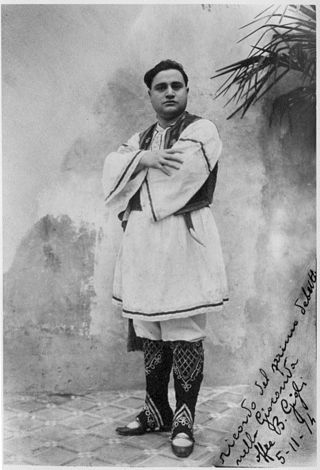
Beniamino Gigli was an Italian opera singer. He is widely regarded as one of the greatest tenors of his generation.
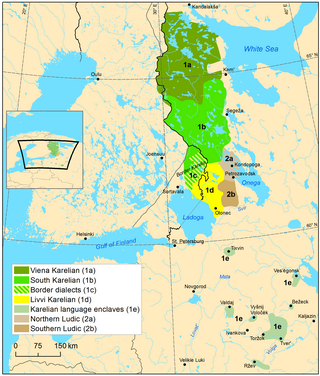
Ludic, or Ludian, or Ludic Karelian, is a Finnic language in the Uralic language family or a Karelian dialect. It is transitional between the Olonets Karelian language and the Veps language. It is spoken by 300 Karelians in the Republic of Karelia in Russia, near the southwestern shore of Lake Onega, including a few children.

The Order of the Lion of Finland is one of three official orders in Finland, along with the Order of the Cross of Liberty and the Order of the White Rose of Finland. The President of Finland is the Grand Master of all three orders. The orders are administered by boards consisting of a chancellor, a vice-chancellor and at least four members. The orders of the White Rose of Finland and the Lion of Finland have a joint board. The President of Finland wears the Star of the Order of the Lion of Finland.

The Finno-Permic or Finno-Permian languages, sometimes just Finnic or Fennic languages, are a proposed subdivision of the Uralic languages which comprise the Balto-Finnic languages, Sámi languages, Mordvinic languages, Mari language, Permic languages and likely a number of extinct languages. In the traditional taxonomy of the Uralic languages, Finno-Permic is estimated to have split from Finno-Ugric around 3000–2500 BC, and branched into Permic languages and Finno-Volgaic languages around 2000 BC. Nowadays the validity of the group as a taxonomical entity is being questioned, and the interrelationships of its five branches are debated with little consensus.
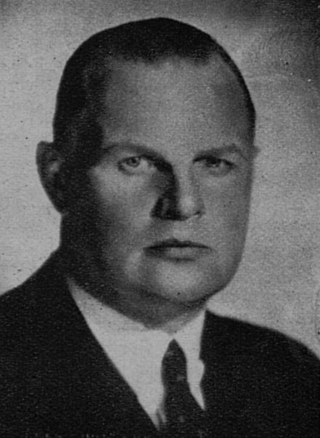
Kaarlo Eino Kyösti Soinio was a Finnish sportsperson, who won an Olympic bronze, and a sport leader and a sportsreporter.

Jalmari Verneri Sauli was a Finnish writer and track and field athlete who competed in the 1908 Summer Olympics.

Salvatore Fisichella is an Italian operatic tenor known for his roles in bel canto operas, especially those of Rossini, Donizetti and Bellini. He has been recognized for the ease and vocal brilliance of his singing, and for having sung more of the leading roles in Bellini's operas than any other 20th century tenor.

Oskar Wilhelm Wetzell was a Finnish diver, who competed at the 1908 and the 1912 Summer Olympics.

Timo Juhani Vihavainen is a Finnish historian and a professor of Russian Studies at the University of Helsinki. He has written extensively on Russian and Finnish history. Vihavainen graduated as a Master of Philosophy in 1970, a Licentiate in Philosophy in 1983, a Doctor of Philosophy degree in 1988 and a Docent in Russian history in 1992. He is a member of the Finnish Academy of Science and Letters since 2009. At the beginning of the 2000s he was among the contributors of the Kanava magazine.

Jussi Niinistö is a Finnish politician and a former Minister of Defence and a former member of Finnish Parliament, representing the Finns Party 2011–2017 and Blue Reform since 2017. By occupation he is a military historian, a docent of Finnish history in the University of Helsinki and a docent of military history in the Finnish National Defence University. In 2013 he was elected as the first vice-chairman of the True Finns, but lost his seat in 2017.

Before 1942, the VR Class Vr1 were originally classified as L1. The Vr1 was a powerful and effective locomotive. Part of them were built by Tampella and part by Hannoversche Maschinenbau AG of Germany. They were numbered 530–544, 656–670, 787–799 and were nicknamed “Kana” ("Hen"). They were operation from 1913-1974.

Paul Peter Christer Lindroos was a Finnish opera singer who appeared in leading tenor roles throughout Europe but was particularly associated with the Finnish National Opera and the Royal Danish Opera. Although he specialised in the 19th-century Italian spinto repertoire, he also sang in many 20th-century works and created the role of The King in Erik Bergman's Det sjungande trädet in 1995. In his later years he was a professor of voice at the Sibelius Academy in Helsinki and the Malmö Academy of Music in Sweden. He died along with his young son in a car accident near Malmö at the age of 59. He is buried in Pohja, Finland, the town of his birth.

The corpus of traditional riddles from the Finnic-speaking world is fairly unitary, though eastern Finnish-speaking regions show particular influence of Russian Orthodox Christianity and Slavonic riddle culture. The Finnish for 'riddle' is arvoitus, related to the verb arvata and arpa.
Arja Anna-Leena Siikala was a professor emeritus at the University of Helsinki, specialising in folk-belief, mythology, and shamanism, along with oral storytelling and traditionality.
Raija Tellervo Sollamo is a Finnish theologian and professor emerita of Biblical Languages in the Faculty of Theology, University of Helsinki. She was the first female professor in the field of theology in Finland. Between 1998 and 2003, Sollamo was vice-rector of the University of Helsinki, thereby becoming the first female vice-rector in Finland. From 2007 to 2010, she was president of The International Organization for the Study of the Old Testament (IOSOT).
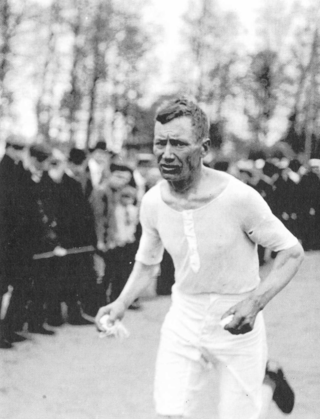
Karl Maurits "Kalle" Nieminen was a Finnish long-distance runner, who competed in the 1908 Summer Olympics.
Finnish national symbols are natural symbols or Finnish national works and prominent figures that are commonly associated with Finland. The most recognized national symbols include the flag of Finland and the lion featured on the Finnish coat of arms.
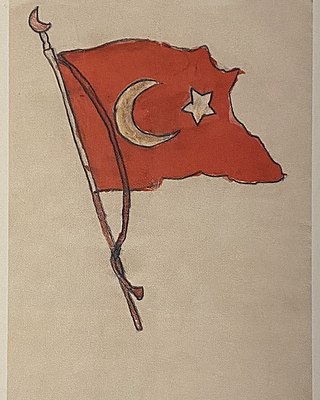
The Tampere Turkish Society was an association of Tatars in Tampere, Finland, which focused mainly on arranging religious occasions and cultural gatherings, such as theater events..
Lauri Asko Antero Sarkola is a Finnish actor and theater manager. He studied at the Svenska Teaterskolan from 1963 to 1966. He had a long career at the Swedish-speaking Lilla Teatern, where he first starred in 1967–1974 and served as deputy director from 1972 to 1974. In 1974–1981 and 1984–1997, Sarkola was the director of Lilla Teatern. From 1982 to 1985, Sarkola worked as a professor at the Helsinki Theatre Academy. He directed the Helsinki City Theatre from 1998 to 2016.
Karelians, also known as Finnish Karelians or Karelian Finns, are a subgroup (heimo) of the Finnish people, traditionally living in Finnish Karelia. Karelians speak eastern dialects of the Finnish language: the South Karelian dialects are spoken in South Karelia, while the eastern Savonian dialects are spoken in North Karelia. The South Karelian dialects were spoken in the Karelian Isthmus prior to the Winter War. Karelians are traditionally Lutheran Christians, with an Orthodox Christian minority, belonging to either the Evangelical Lutheran Church of Finland or the Orthodox Church of Finland respectively.
















